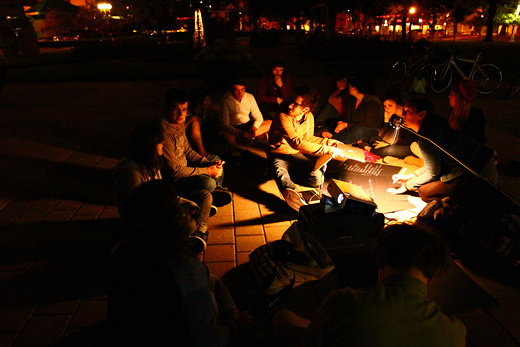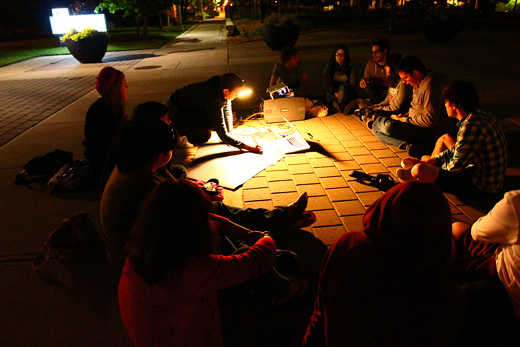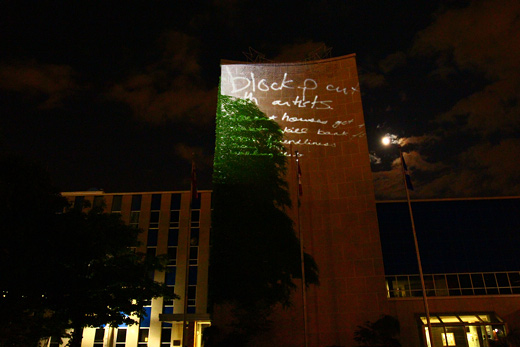Last night, in front of city hall, we had a conversation about the ways we want to shape our city.
In the midst of rising tensions around existing city services and new infrastructures, there seems to be a renewed wish for not just more public dialogue with the city, but a dialogue based on transparency and vision.
We haven’t been seeing that kind of dialogue, so we thought we might try to have our own.
We took our projector, battery, some bristol board and paint markers and started asking questions of the handful of community members who showed up at 9:30pm last night. We setup a camera on the bristol board and shot the projector at the side of City Hall.
We wanted to demonstrate what public process can look like — how dialogue can unfold in a public way.
We started by asking what we might change or create tomorrow, if we had the chance. One by one, we came up with:
- A cohesive community plan that’s legible to all
- Buses that arrive on time and more often
- Pedestrian-friendly and accessible development
- Pedestrian access to Detroit
- A more open border
- Open and transparent and consultive funding proceses and policies
- More assistance and focus on small businesses
- The disappearing of Walker Road, south of Division
- Press that covers the arts and employs critics to do so
- More green space
And incomplete wish list, to be sure, but a list that was developed by 14 twenty-somethings based on very intimate experiences with this city.
On to a new list, we want more:
- Vegan restaurants
- Focus on the local arts
- After school youth activities
- Accessible social programs
- Free culture
- Space for community activities
- Information and messages (non-ads)
- Updated libraries
- Public consultation
- People that care about this place
- Opportunities for artists to be recognized municipally
- Funding for students to take on unique research
- Money for creative activities across the city
- Focus on repair and reuse over rebuild
And then, another list, we want less:
- Hold-ups
- Negativity
- Urban sprawl
- Construction
- Gambling
- Sleaze
- Narrow-mindedness
- Consumer culture
- Wastefulness
- Ignorance around sustainability
- Complaining
- Cement
The best part of compiling these lists is how they came to articulate a response to the city, beyond administration, staff, or even exclusively things over the purview of city bureaucracy. It was a response to the things we see unfolding in front of us and how we could imagine addressing them, ourselves.
The ideas that we discussed started pointing us towards activities that might unfold at a neighbourhood level.
So, then we wasked how — how might we start to facilitate these things we want to happen?
- Meetings like this one on a regular basis
- Civic engagement embedded in undergraduate courses
- Reinventing Speaker’s Corner
- Action Committees
- Bartering practices
- Targeting youth for new ideas
- Parallel city council meetings
- Mixers for Doers
- Potlucks
- Portals
- Block Parties with artists
- Vacant houses get free maintenance
- Street-level skill bank for neighbours
- More friendliness
- Walking clubs
- Animating your front yard
- Being outside
- Developing shared public spaces
- Fireworks and sidewalk chalk
- Visual timelines for activities
- Fun time together
We continued to take notes and the conversation continued to build, and I think we left off asking about something you would never change about this place … wish we had written it down.
However, the night left us anxious for more time together, outside in a place like this.
Meeting new people at random…
…and surrounding ourselves with old friends makes for an incredible summer night.
Being able to project our notes as we took them down and display them for anyone to see seemed like a great start to thinking about how the city could open up its public consultation.
But really, it seemed most important to do this again — light up a public space with a small lamp, get a bunch of paper and markers, and talk about making the city the place we want to live. These lists have already sparked new projects that I’m hoping we can tackle in the coming months. I wouldn’t mind doing this again sooner rather than later, hopefully we can entice some more people to join us next time.
















a beautiful peaceful constructive circle
write large on the civic wall of engagement
i appreciate this
thanks for doing and sharing
As someone who works within the city’s system, I would love to participate in one of you circle of ideas. I truly believe in innovative thinking though many in administration have a cynical or fearful approach to it. It frustrates me constantly.
Cheers,
Pippilou
Cool! RT @BrokenCityLab: City Counseling (Session #1) http://bit.ly/kjg87w by Justin #BCL #city #consultation
great job! really wish i could have made it
Wow, this really inspired me, thank you for hosting and sharing this!
A project you might have heard of is the City repair Project working with placemaking in Portland, Oregon.
I just attended their annual Village Building Convergence. So much was transformed in the city in just 10 days and they are using very interesting methods too, to get the community into a dialouge about what environment they want to live in and to then transform it into that together.
I highly recommend you to get in touch with them , they are amazing.
http://vbc.cityrepair.org/
http://cityrepair.org/
Cool idea for an open meeting. Wish I could have been there.
love this – after hours on the outside wall of city hall is where the real public consultation happens.
What kind of outcome do you (Justin) think would occur if you had done a very intensive marketing campaign to get people from Wards 2, 3 and 4 in Windsor?
Would you have preferred the input of a large group of people from these areas, numbering in the 25-60 people range?
Or do you think this is a good start with this kind of group? etc.
Good questions, Stephen — I’ll try to address them below.
So, to be honest, I’m not sure about what the outcome would’ve looked like had we been able to mount an intensive marketing campaign ahead of this event.
My understanding was that Paul Chislett had organized a series of vital community meetings in response to the city’s consultation meetings around the closing of the libary and community centres over the last few weeks. While I was unable to attend those meetings, I’m confident that his organizational efforts made a huge impact in bringing the incredible turnout of community members to city council on Monday night.
I think that the small event we pulled together similarly came as a response of sorts to the process of city consultation (in general), but not necessarily around those specific issues noted above. And, (at least personally), I know I wasn’t engaged enough with the issues around the new aquatic centre to feel like I could facilitate a productive community meeting around those issues in this format.
At any rate, I know that I personally got a lot out of this experience and the process, and I could certainly imagine using a similar format to do another session down the road with a lot more notice for the general community and possibly tackling a specific issue. But, I also think there’s a lot of value in providing a format (a place, the materials, some level of coordination and facilitating) to host a discussion, without necessarily directing it towards specific issues (as important as they may be). As I noted in the post, the conversation moved around a lot, addressing at times very large problems and at other times very doable actions — all of it, however, came from a very earnest investment in thinking about Windsor, and I believe that is very important in and of itself.
Bottom line, would love to do this again, and it would certainly be interesting to understand how this format might lend itself towards pertinent issues in the community, but I’m very happy to have been able to start this off on a small scale.
That’s pretty much what I was thinking. There seems to be more “room” for creativity when a smaller group of people are involved. Based on some of the results you posted, there was a very interesting variety of ideas/solutions/desires.
Though I think I was most concerned with the type of people in attendance. Is it part of Broken City Labs intentions to reach out to members of the community? That seems to be one of the internets biggest problems. A very small and niche group develops. Though good thing there were new comers, so there is some progress there.
This post made me smile (less ‘sleaze’), reminisce (the negativity), and get excited (more vegan restaurants!!! and the whole discussion and process, of course). This is awesome. I think every city should be doing something like this, or more of it if they already are. Keep it up!
I like the idea of having civic engagement embedded in undergraduate courses. To that end, I’ve already pitched a proposal to offer/teach courses on civic/community improvement through St. Clair College already, so if any of you have contacts there or at the U of Windsor that could help drive this idea, we can get this one started.
Civic engagement/improvement should also be embedded in primary/junior school curriculums as well. There are links to art, physical education, math, and many other courses.
One more thought – it would be great to use this technique to show what ugly buildings could look like with a little Photoshopping. It would be easy to change the colour on the spot and the crowd could vote with applause for the designs they like best. Then local artists could be hired to paint/fulfill the desired transformations.
Broken City Lab – City Counseling (Session #1) http://bit.ly/ivQ3ZG
Awesome and inspiring.